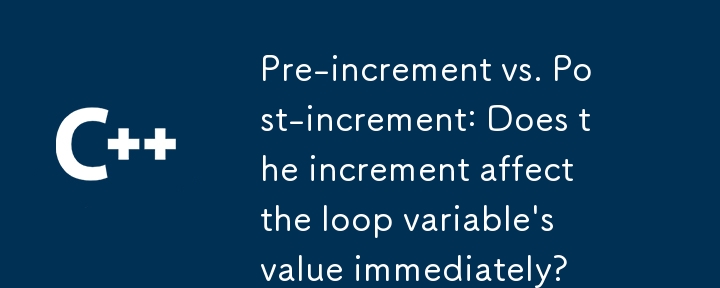Home >Backend Development >C++ >Pre-increment vs. Post-increment: Does the increment affect the loop variable\'s value immediately?
Pre-increment vs. Post-increment: Does the increment affect the loop variable\'s value immediately?
- Barbara StreisandOriginal
- 2024-11-03 11:37:29622browse

Understanding Pre-Increment and Post-Increment in Loops
Loops, such as for and while, are commonly used in programming to iterate through a block of code. When incrementing or decrementing a loop counter, developers have the option to use both pre-increment and post-increment operators.
Pre-Increment vs. Post-Increment
- Pre-increment ( i): Increments the loop counter before performing any operations.
- Post-increment (i ): Performs any operations before incrementing the loop counter.
Impact on Iteration
The difference between pre-increment and post-increment becomes apparent when used within the loop:
Example:
while (true) {
//...
i++;
int j = i;
}
Question: Will the variable j contain the original value of i or the incremented value of i at the end of the loop?
Answer:
In this example, the post-increment operator (i ) is used, which means that i is used with its original value, then incremented. Therefore, the variable j will contain the original value of i.
Usage in Calculations
The difference between pre-increment and post-increment becomes critical when the result is used in a calculation:
Example:
int j = i++; // i will contain i_old + 1, j will contain the i_old.
In this scenario, j will contain the original value of i, while i will be incremented by 1.
int j = ++i; // i and j will both contain i_old + 1.
In contrast, j and i will both contain the incremented value of i in this example.
By understanding the difference between pre-increment and post-increment, programmers can write more efficient and accurate code, ensuring that the loop counter behaves as expected.
The above is the detailed content of Pre-increment vs. Post-increment: Does the increment affect the loop variable\'s value immediately?. For more information, please follow other related articles on the PHP Chinese website!
Related articles
See more- C++ compilation error: A header file is referenced multiple times, how to solve it?
- C++ compilation error: wrong function parameters, how to fix it?
- C++ error: The constructor must be declared in the public area, how to deal with it?
- Process management and thread synchronization in C++
- How to deal with data splitting problems in C++ development

